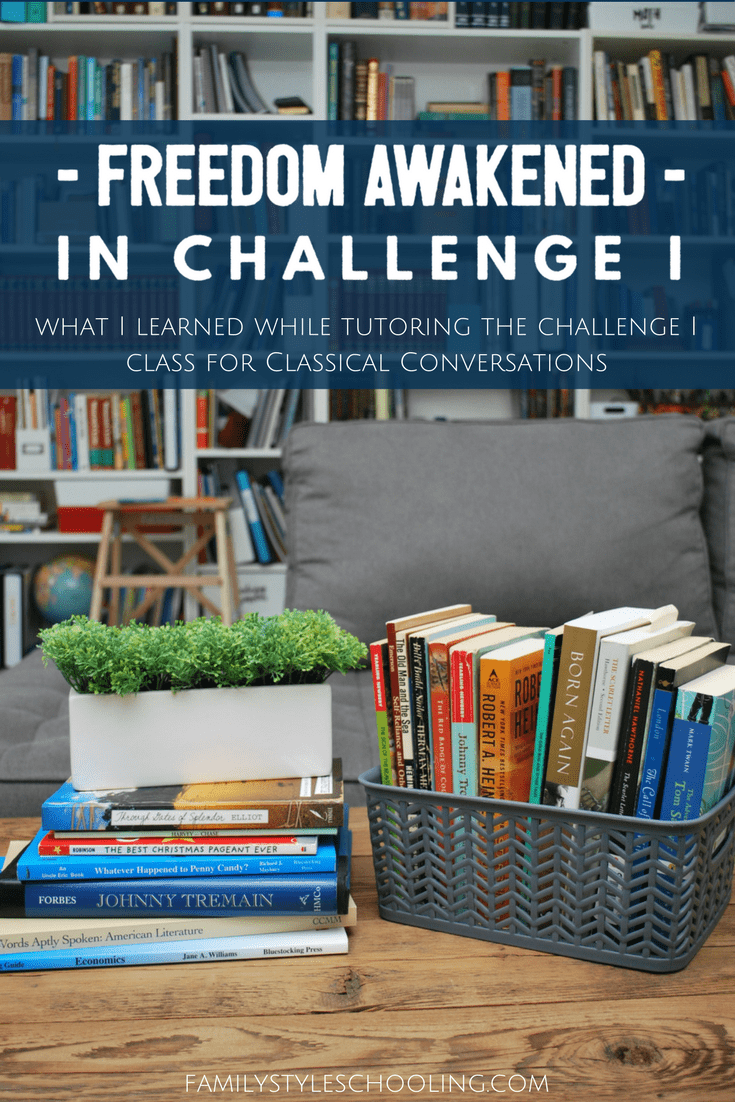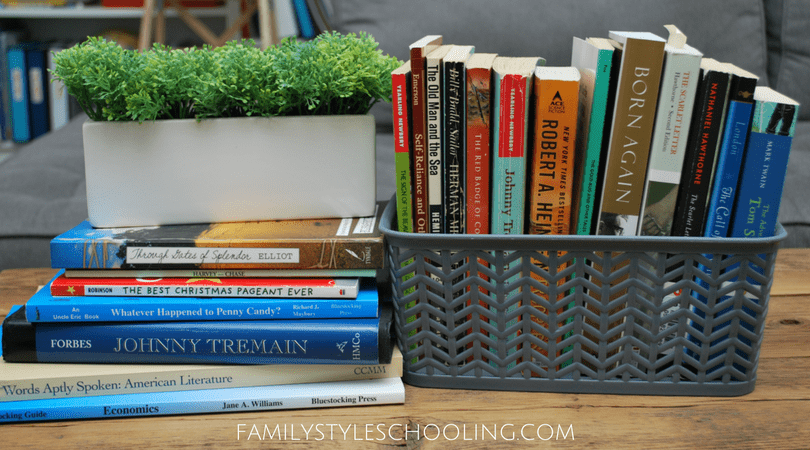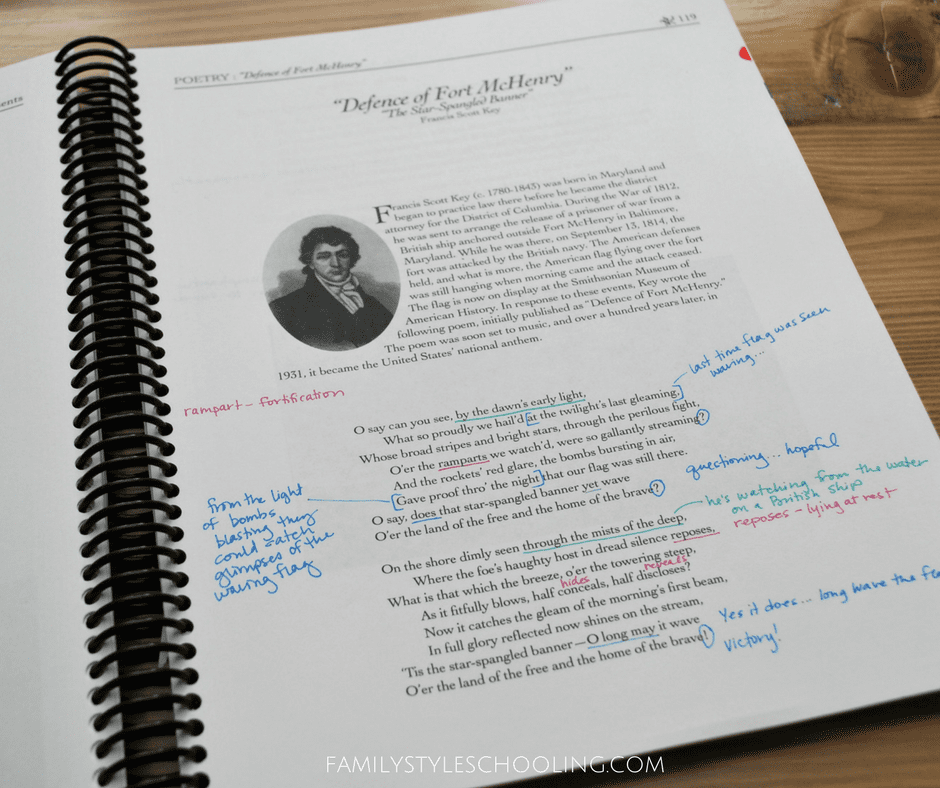Freedom Awakened in Challenge I
During the 2015-2016 school year, I had the privilege of directing my son's Challenge I class. It was my third year with four of the students, and second with two more. Surprisingly, the class went from six in Challenge B to twelve in Challenge I. That was a huge adjustment for me as a tutor, but once we worked out the class dynamics, it was great to have all of them there. There were even two that were brand new to Classical Conversations. Challenge I is a great place to start.
The theme of Challenge I is Freedom. It is drawn out in the materials they study, but I also think that Challenge I is a year in which students realize that the end of their homeschool career is near. This realization wakes them up in a sense. It's a beautiful thing.
Freedom is an exciting topic of study, and students respond well to the volume of material thrown at them. Challenge I fortifies old skills, introduces new concepts, and awakens undiscovered loves.

Challenge I Fortifies Old Skills
In Challenge I, students repeat several skills that were introduced in Challenge A and continued in Challenge B.
Continuing With Latin
If they've been in CC for a couple of years, this will be their third year of Latin. The challenge here is that if they have not taken the time to memorize the grammar of the ways nouns and verbs are formed, they're going to have trouble keeping up with the pace. In Challenge A they complete lessons 1-15 of Henle I, and in Challenge B they complete lessons 1-25. (This was my experience but it is subject to change).
When they reach Challenge I, they start in lesson 7 and work to complete the book. None of my students made it that far (there are 42 lessons), but they made it pretty far. The good news is that in the introduction, Henle says that if you master lessons 1-26, you can move on to the second year text. I can testify that the second year text does go back over the additional lessons, but at a faster pace.
If you're not planning on keeping up with your child in Latin, find an additional resource to help them. This is a heavy load to carry. I'm hoping to have a great resource to offer you this summer, so stay tuned!
Continuing With Lost Tools of Writing
For any of you who thought in Challenge A that your child's writing was going backwards, just wait for Challenge I. Since the kids have been practicing the persuasive essay for a couple of years, everything clicks so much more this year. Even students who were new to my class were writing amazing essays.
One of the reasons that I think this happens is that the books the kids are reading offer some really great issues to discuss. In Challenge A, it can be challenging to be persuasive about A Gathering of Days, but there is no way to avoid a controversial topic in The Scarlet Letter or To Kill a Mockingbird.
The richness of the content they are reading, along with reading some well written original American documents, shows up in their writing. The fruit of your three year investment will be ripe for the plucking. It's a good thing, because in Challenge II, the writing assignments vary, and their skills will be put to the test.
Science Throwback to Foundations
I love the science for Challenge I. We use Exploring Creation with Physical Science. While this might seem like a simple science, it's perfect. Students are learning how to take notes from a science text and conduct their own experiments with projects that are a throwback to their years in Foundations. So many of the projects are familiar to experiments they observed in Foundations, but now, they are the ones testing out the concepts and writing up lab reports.
The most memorable experiment was the cornstarch goop experiment. We had so much fun watching it transition from solid to liquid! Next time I tutor Challenge I, I will make sure to do this experiment outside.

Challenge I Introduces New Skills
I didn't realize how well trained they all were in Challenge I until I went back down to Challenge A and realized how new all of the skills are to a fresh crop of challenge students! Even though they have lots of great experience from their previous challenge years, there are still new hurdles set out for them to continue stretching their minds.
Policy Debate
Unless you've previously been in a debate club, policy debate will stretch all students. Building off of the current event discussions in Challenge B and the continual practice with LTW in being persuasive, students have the opportunity to debate a current policy with their peers.
The greatest challenge for my class was avoiding the morality of the issue and just debating the policy. We started off with capital punishment, and that was a real challenge to leave morality out of the conversation. The good news is that they don't have to master policy debate in one year. Actually, I don't think they're given enough time in Challenge I to assume mastery is even possible. That's okay!
If your child really enjoys debate, join a debate club. This will give them hours of additional practice as well as coaching from someone who is more experienced in debate. You may find yourself with a tutor that is already familiar with debate. That's awesome, but don't expect it. There is a lot going on in Challenge I, and debate is just one small part. That's also good news for students who don't love it as much!
Mountain of Reading
It was a challenge to go from the five books in Challenge B to the list of nineteen readers in Challenge I. This is a lot of reading for even a strong reader. The good news is that we survived! The books in this level are really pretty interesting reads.

Don't forget that as the teacher, you can modify the list. Make sure if you are doing this that you are modifying in advance and letting your tutor know. Don't find yourself at the end of the week with a book unread and excuse the work. Your student will totally take advantage of you!
Annotating Documents
If your student hasn't picked up on the highlighting method yet, the study of original American documents provides a great opportunity to learn and practice the skill of annotating. These are not easy reads, so highlighting, underlining, and defining what they're reading really helps draw out the meaning in these works of art.

Money Matters
In the semester of economics studies, classes will participate in a Stock Market Game set up by the tutor. It's a free game, and students are given $10,000 of virtual money to invest. Our class had so much fun investing and watching the stock market together. It was fun to see the kinds of businesses each student invested in and if they kept their money in the same place all semester, or tried to move it around.
At the end of their studies, students prepare a Cost of Living project in which they research a potential career, find it's annual income, and budget out their life accordingly. This was a great project for all of the students! Very eye opening.
Spring Protocol
Challenge I students and above organize a special event to practice their manners and elevate their love of cultural events. Simply, it's a time when students dress up, share a nice meal, and attend a cultural event together. Each community does this differently. We had fairly unique circumstances surrounding our protocol event, so we went to a nice steak house together for dinner, and then attended a musical a couple of weeks later starring one of our very own students. It's just a great way to continue pointing students towards maturity and adulthood.
Challenge I Awakens Undiscovered Loves
I think what I loved the most about the Challenge I class was starting to see these awkward and immature teenagers start to show signs of maturity. The discussions were centered around deep ideas, and there are the buds of self control starting to emerge! While we didn't have any romantic connections in class, other loves were awakened - the best kinds of loves.
The Beauty of Music
Our Challenge I year was the first class to add music theory to the list of studies. While I'm not new to music theory, some of the concepts were very new to me. Even though some of the students struggled to wrap their minds around the concepts towards the end, the study sparked a new appreciation for music in several of the students.
My son was inspired with his new found ability to read music to try to play some of his piano pieces on the guitar. This sparked a new found love of classical guitar music. His study in Challenge I has really produced some beautiful fruit.
The Joy of Acting
During the first semester, we had so much fun reading through Taming of the Shrew several times. However, I think what really brought the acting to life was some of the impromptu games we played while preparing for their interpretive renditions of a selection from a book of their choice.
I've tried the impromptu games with my Challenge A class this year, and it hasn't been as successful. I think the maturity for these games to be successful comes in Challenge I. The improv games brought our class together in a fun and joyful way.
Challenge I is a pretty wonderful year for reinforcing previous skills, introducing unfamiliar elements, and sparking new interests. Don't miss the joys of a great year of study by getting lost in a mountain of work. Take a step back and see the beautiful things going on in and around your students. I think you'll be surprised at the freedom that is awakened in your student; a freedom to thrive.
Betsy Strauss is an unexpected homeschooler, mother of three, who is in a relationship with a sweet man for life. She loves reading books, drinking coffee, and learning anything with her kids.


Great post – and our family is eagerly awaiting your Latin resources! The ones you have developed have really helped my girls (and their teacher). Thanks, Betsy.
Would you recommend any reading or other work in the summer to prepare for Challenge I? We just completed Mock Trial yesterday, so my twins deserve a well earned break! But I also am looking ahead and wondering what they could do this summer to get a jump start on the next Challenge program. And is that even necessary?
Wow! Congrats on finishing Mock Trial! You definitely need a break after that! I really just recommend to my students to start reading some of the books. There are 19 in Challenge 1, and if they’ve tackled even a couple of them over the summer, it feels good to have that started. Here are my own study plans for my summer. We often take notes when we read during the summer, and I’ve created these printable reading trackers to make it more fun!
Hi, Betsy! Thanks for this great post. My son is about to begin second semester of Ch1, and I’m overwhelmed with the projects that will be due this spring. Do you have planning advice for us? Thanks again.
I know how overwhelming the list of projects can be at the first of the semester. What I like to do is look at what I need to scale. The stock market project is fun and doesn’t take much time once it’s set up, unless your son decides he wants to be a day trader. The cost of living project is also a fun one and can be finished in a couple of days. I like to plan to do those on break weeks when you’re not working on other things. Another big project is the science research paper. My encouragement for this is to pick a topic that has simple sources available. If you get too specific, your son will have to be reading scholarly books and articles that are hard to find and hard to read. My son researched the moon, and my daughter researched trash in the ocean. Both topics gave them content that was easy to find and sort into manageable sections to write from. If you keep up with the guide and tackle this project a little bit at a time, it really is similar to Essentials where you’ll be writing a couple of paragraphs a week. The last one I remember is the other policy debate and IE. Those can both be scaled to reasonable work loads as they fit into the rest of what needs to be done. I think the fact that you’re already hoping to plan for these things in advance will help your semester get off to a great start!
That’s awesome that you had a class of 12! Currently for the our fall campus its just my oldest daughter and one other student. Is it possible for such a small class to continue and thrive or would a larger class serve them better? Would they get more out of it? There is a campus further out that has a challenge one class. It would be a further drive but I just want what’s best for my daughter. Curious of your thoughts.
The longer I have been a part of Classical Conversations, the more I value smaller classes. Sure, it’s difficult if someone is sick or unavailable, but there is no hiding in a small class. Students get so many more opportunities for leading, sharing their ideas, and getting help with problem areas. My niece was a part of a Challenge 4 class of three, and she really loved it. Small classes have benefits that larger ones don’t. I wouldn’t give up! We’ve also had students join every year of our daughter’s high school. Blessings on your journey!
What are some impromptu games you played?
Here are some of my favorites: https://familystyleschooling.com/2017/03/22/improv-games/